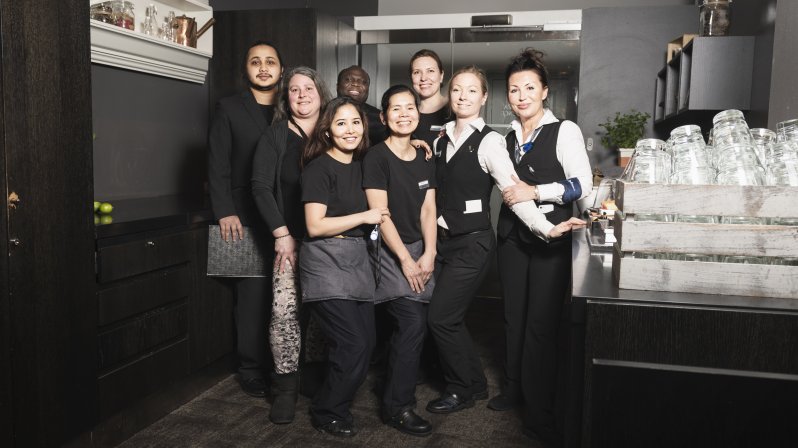Multilingualism is an asset in an international hotel environment
 Radisson Blue Plaze employs people from 17 different nationalities. Their common motto is that it’s ok to have fun at the workplace. From left to right: Mangesh Vaidya, Simone Klimpel-Koskela, Poanam Gurung, Samuel Asoro, Imelda Arcangel-Campita, Diana Mataite, Helinä Winton and Nadja Polo-Cotogno. Photo: Emilia Kangasluoma.
Radisson Blue Plaze employs people from 17 different nationalities. Their common motto is that it’s ok to have fun at the workplace. From left to right: Mangesh Vaidya, Simone Klimpel-Koskela, Poanam Gurung, Samuel Asoro, Imelda Arcangel-Campita, Diana Mataite, Helinä Winton and Nadja Polo-Cotogno. Photo: Emilia Kangasluoma.
Simone Klimpel-Koskela is on her third year of serving as the chief shop steward for PAM at the high-end hotel Radisson Blu Plaza. Her workplace includes employees from several different countries, and they have been able to form a community by fostering an open culture of discussion.
“This is maybe a little louder than your average Finnish workplace,” says Simone Klimpel-Koskela of her international workplace in the heart of Helsinki.
“We are all very different people, but we’re never bored. We try to have fun while we work. Part of the job is to talk to the guests and to be there for them. The guests also enjoy the international atmosphere that we’ve been able to create.”
Fluent English is a prerequisite for working in an international environment, as English is often used alongside Finnish as the working language. At the moment, the hotel’s housekeeping and restaurant duties employ people of approximately 17 different nationalities.
Problems solved by talking
According to Klimpel-Koskela, the key to a positive work atmosphere is a genuine desire to understand others, along with equal treatment for everyone.
“You cannot entirely prevent disagreements, but they are usually caused by simple misunderstandings, not cultural differences. We tend to clear up problems quickly. That also means that there’s nothing to mull over,” she explains.
Simone Klimpel-Koskela herself hails from Germany, and as a German, she is often the first to tackle any problematic situations that arise. Her coworkers have nicknamed her emäntä, a Finnish word meaning the mistress of the house, because she has always been good at giving advice and getting things done.
“When I see something going on, I like to address it as quickly as possible. For example, if two employees are quarrelling, they may be able to resolve the situation between themselves, or they may call in the shop steward to help. I will always listen and I’m always available. We very rarely have to involve the supervisor, as we’re typically able to figure things out amongst ourselves. We resolve problems by talking.”
Klimpel-Koskela had only had one job in Finland when she came to Radisson Blu Plaza through a personnel agency in 2011. Getting a permanent position at the hotel after a three-month stint felt like winning the lottery. She likes her job, and it shows.
“When I came from Germany to Finland a decade ago, people often asked me how I’d learned Finnish. I told them that I lived in a rural area where I had to learn the language. I still can’t write in Finnish very well, but I get by and that’s what matters.”
According to Klimpel-Koskela, being open to new things and new people makes life easier. Lately she has been thinking a great deal about bullying at the workplace, particularly between coworkers. How does it begin and why?
“I think bullying is caused by jealousy, and by people not being to accept themselves for who they are. If you’re more open to things, you’re able to find balance. If you’re living the life you want and you’re in balance, you won’t feel the need to bully others. If everyone were able to reach that balance, there would be no workplace bullying,” she says.
This is another reason why she is happy to work in an organisation that has a zero-tolerance policy towards harassment and bullying.
Klimpel-Koskela emphasises the importance of trust, not just among coworkers, but also between the supervisor and employees.
“Bridges are built together. An open workplace which encourages dialogue is a happier workplace. Together we can make our daily work better.”
Klimpel-Koskela herself is fluent in five languages. She says the hotel guests appreciate her language skills, and her coworkers have sufficient conversational skills to manage a little small talk in several languages on the hotel corridors, in the restaurant or at reception.
“Our guests are delighted when the employees can greet them in their own language, or answer their questions in Japanese or Swahili, for example. That’s top-tier service,” states Klimpel-Koskela.
This means that multilingualism is an asset in the hotel industry. Klimpel-Koskela’s answer to anyone who is uncomfortable about speaking multiple languages at the workplace is to point to her workplace:
“We are learning a lot about each other’s cultures, and every person brings new ideas with them. To me, diversity is an asset. I would also say that we may be a little more open than the average Finn.”


